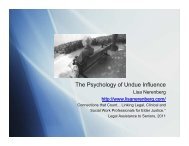Undue Influence: Definitions and Applications - California Courts ...
Undue Influence: Definitions and Applications - California Courts ...
Undue Influence: Definitions and Applications - California Courts ...
Create successful ePaper yourself
Turn your PDF publications into a flip-book with our unique Google optimized e-Paper software.
guardians, real estate agents or brokers, lawyers, estate executors or administrators, <strong>and</strong><br />
stockbrokers. Non-professionals may also have a fiduciary responsibility. Relatives or friends,<br />
for example, may serve as guardians, conservators, or trustees.<br />
“Reliant relationships” are ones in which the weaker parties rely on others for judgment<br />
or advice. An example is the doctor/patient relationship. In “dominant-subservient relationships”<br />
the weaker person is subservient to the dominant person. Persons likely to be in subservient<br />
relationships include those who are mentally or physically impaired. These categories are not<br />
mutually exclusive <strong>and</strong> there is potential for overlap among them.<br />
Family members <strong>and</strong> friends may also have an informal duty of trust <strong>and</strong> confidence<br />
toward weaker members. When undue influence has been alleged in contracts involving family<br />
<strong>and</strong> friends, courts have looked at whether the weaker parties were very old, mentally<br />
incapacitated, suffering from debilitating sicknesses, or otherwise physically or psychologically<br />
impaired. In general, family relationships between husb<strong>and</strong>s <strong>and</strong> wives <strong>and</strong> between parents <strong>and</strong><br />
children are considered confidential relationships (Nievod, 1992).<br />
In situations involving parties where there is no confidential or fiduciary relationship,<br />
courts may still determine that an individual has taken advantage of another’s weakness through<br />
the use of his or her own disproportionate strength. The courts have found that "disproportionate<br />
strength" may be based upon knowledge, experience, training, or relationship. Factors that<br />
contribute to the weaker parties’ weakness include diminished mental capacity, failing health,<br />
isolation, <strong>and</strong>/or distress. In these cases, courts also consider what benefits the powerful parties<br />
provided to the weaker (Frolik, 2001).<br />
<strong>Undue</strong> <strong>Influence</strong> in the Execution of Contracts <strong>and</strong> Wills<br />
<strong>Undue</strong> influence is among the most commonly asserted grounds for invalidating<br />
contracts, including wills, deeds, or trust instruments. It is addressed under a branch of law<br />
called “constructive fraud,” which covers situations in which someone is manipulated into doing<br />
something with legal consequences through the actions of others who have an unfair advantage.<br />
In these situations, courts may decide that the person is not exercising free <strong>and</strong><br />
independent judgment <strong>and</strong> that the action should be treated as fraud even if all of the technical<br />
elements of fraud have not been proven. If undue influence is proved to have been exercised in<br />
99




